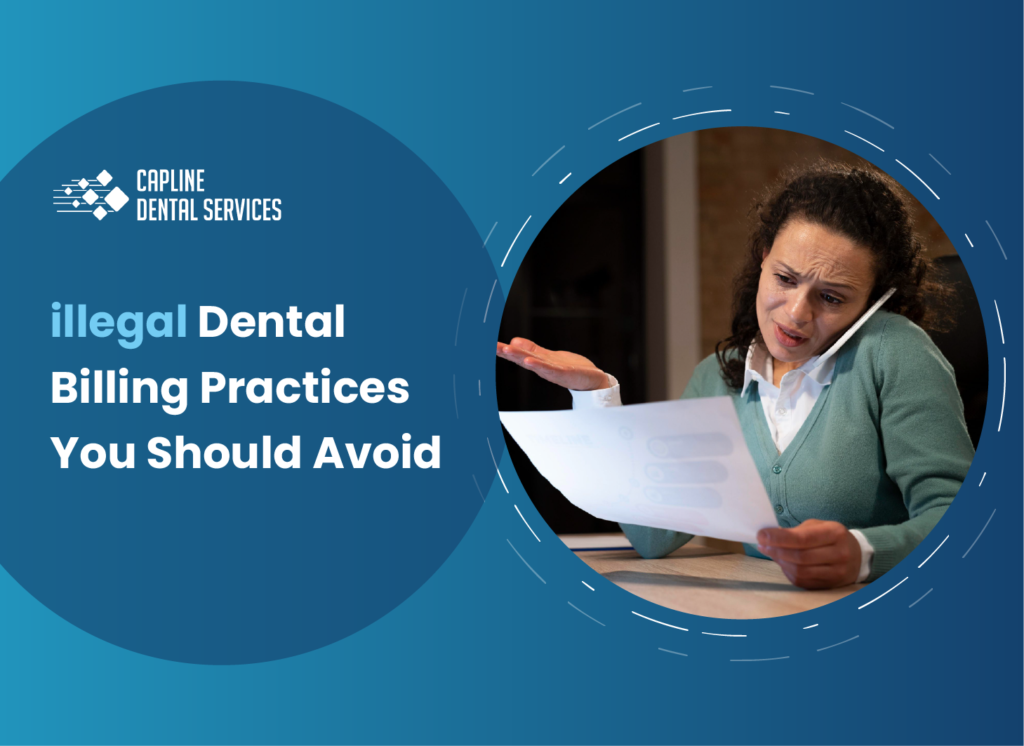
Intentionally or inadvertently, illegal billing conduct in dental healthcare can impart significant harm to the smooth running of operations of a dental practice. Therefore, it is important to consider the potential impact on the professional standing and the prestige of the dental practice.
A Glimpse On Illegal Dental Billing Practices
Here, let’s explore several dental billing practices that are illegal and dental offices should avoid.
Upcoding
Upcoding is a fraudulent activity that must be avoided. It encompasses engaging in a practice of charging for services at premium rates that exceed the actual services rendered. This can be achieved through the utilization of codes that reflect services not rendered to the patient, or codes representing procedures that are more complex than those actually performed by the practice.
As per government regulatory bodies, upcoding can be considered to be an act of documenting and billing for a procedure that is more intricate and carries a higher charge than the actual procedure rendered. Insurance companies and regulatory agencies rigorously examine the practice of upcoding in order to prevent the circumvention of insurance rules and the submission of excessive bills.
Unbundling
This entails the segregation of procedures into multiple components with a corresponding cost and thus resulting in a higher cumulative charge. This can happen due to oversight or an attempt to capitalize on maximum reimbursement. To avoid unbunding, dental practices must be well-versed with payer rules regarding bundle services. The dental billing team must only use the necessary codes to outline services rendered precisely.
Of all the wrong practices, the most prevalent one is the act of invoicing for services that have not been rendered or finalized. It is imperative to verify the accuracy and completion of all claimed services. Service providers are requested to refrain from artificially inflating claims by upgrading the level of service or misrepresenting routine cleaning procedures that warrant a higher fee. One must uphold meticulous and unambiguous records of all services provided.
Altering the dates of service
An additional form of unethical billing activity involves the manipulation of service dates on claims. This occurs when a claim is filed with an inaccurate service date, such as invoicing for a dental crown on the date of preparation rather than on the date of seat/cementation.
While seemingly inconsequential, the service date holds significance in terms of patient coverage, particularly in cases where treatments were administered prior to the plan's effective date or waiting period.
In order to uphold ethical standards in billing, it is critical for the team to confirm the submission of claims that accurately and appropriately indicate the dates of service, thereby mitigating any potential legal or financial ramifications.
Waiving deductibles or copayments
There could be plans that offer immunities for deductibles or maximum limits when it comes to diagnostic and preventive services. However, it should be noted that this benefit may not be available in all programs. Furthermore, certain plans may necessitate patient coinsurance even for in-network diagnostic and preventive services. Considering the discrepancy between the billed fee on the claim and the intended collection amount, the act of waiving these payments would be deemed fraudulent. Dental practitioners should refrain from waiving these payments and instead should contemplate the option of providing payment plans or declining to offer care in cases where patients persist in seeking a waiver. Implementing appropriate invoicing procedures contributes to the promotion of transparency and maintains the highest standards of financial integrity.
Not billing out things you do
A practice must have all treatment meted out to patients properly documented as well as billed. Ensuring proper billing procedures for each patient is essential to maintain the legal integrity of your dental practice. Even when extending a friend or family discount, it is essential to provide an itemized invoice that clearly displays the discount applied, either as a write-off or as a courtesy.
This practice enables the team to maintain comprehensive records of all earnings, even when certain amounts are not fully realized as a result of applied discounts. One must avoid regular usage of discounted services. When offered, the practice should maintain a comprehensive record of the corresponding bill and ensure that the discounted fee is officially documented on the claim form.
Charging the patient, a fee that is different from the one billed to the insurance carrier is a fraudulent practice. A uniform fee should be applied to all patients, and diligent efforts should be undertaken to collect the complete payment.